University Module: Academic and Employability Skills Report Analysis
VerifiedAdded on 2022/12/16
|8
|2329
|1
Report
AI Summary
This report analyzes the importance of academic and employability skills in career development, focusing on a student's experience in a relevant university module. The report utilizes the Gibbs reflective cycle to examine various aspects of the learning process, including time management, academic writing, public speaking, and online learning. It provides a detailed description of the student's experiences, feelings, evaluation, and analysis of the module, concluding with an action plan for future improvement. The report emphasizes the practical application of these skills and their contribution to personal and professional growth, highlighting the value of reflective practice in enhancing employability. The report also includes a comprehensive list of references to support the analysis and conclusions.
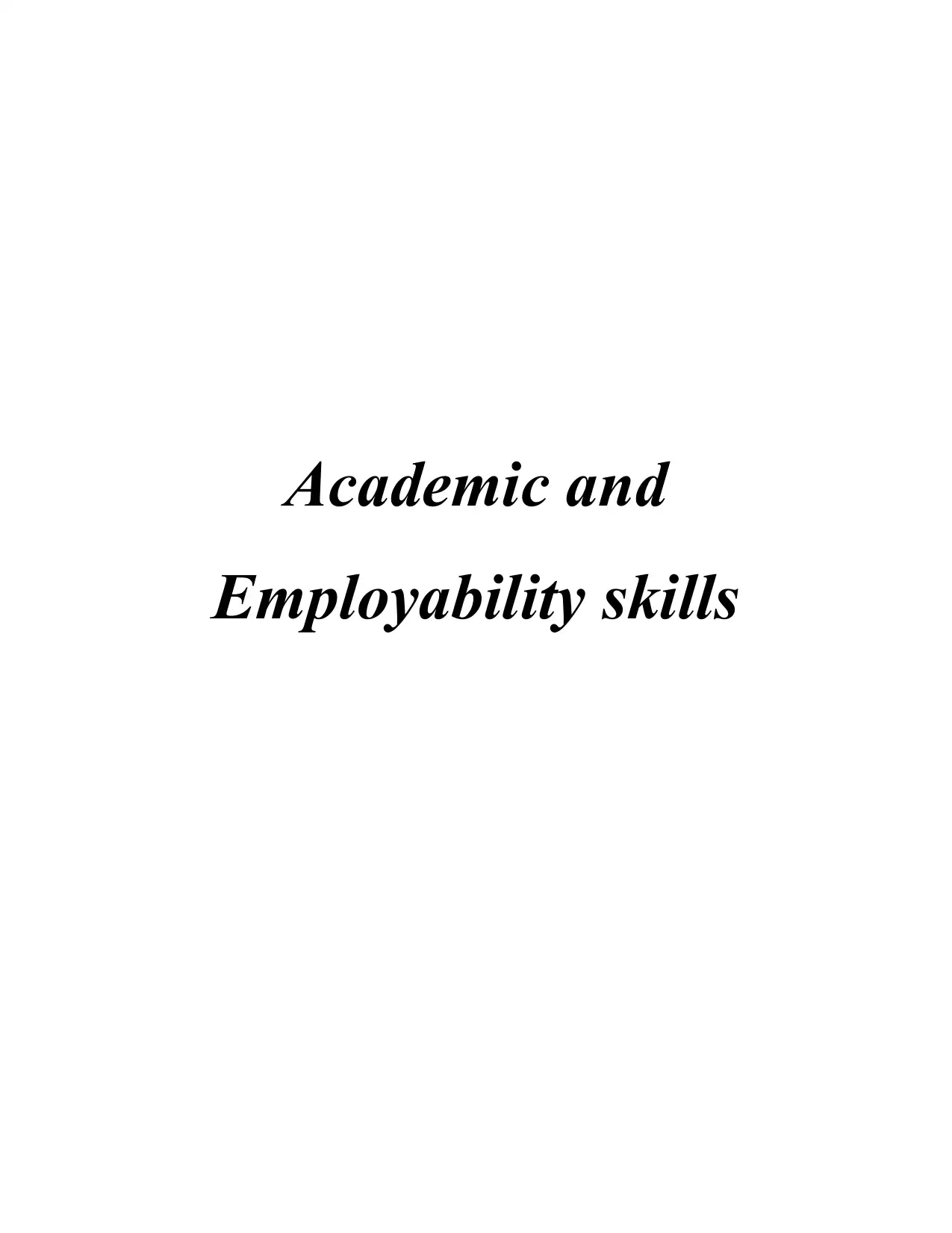
Academic and
Employability skills
Employability skills
Paraphrase This Document
Need a fresh take? Get an instant paraphrase of this document with our AI Paraphraser
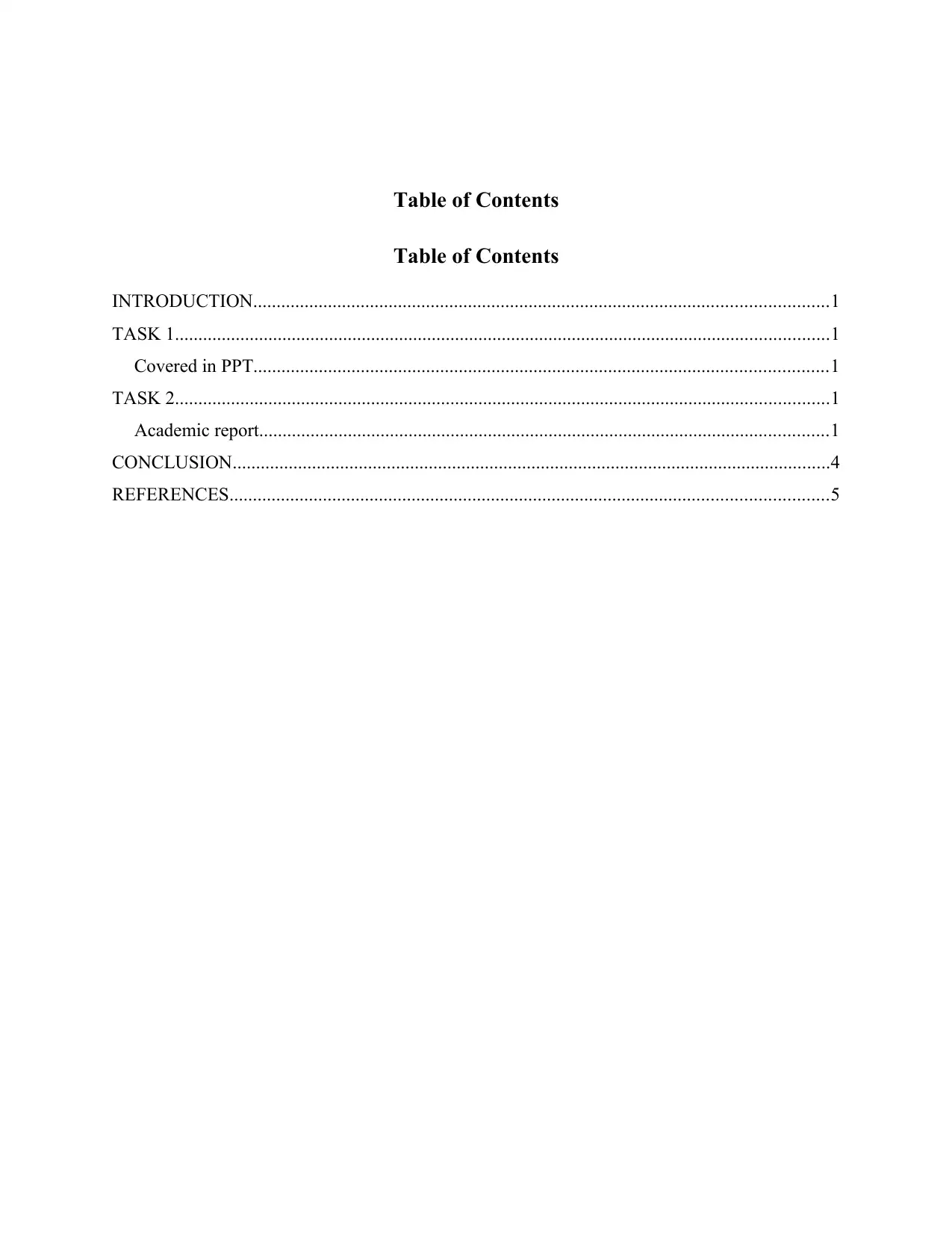
Table of Contents
Table of Contents
INTRODUCTION...........................................................................................................................1
TASK 1............................................................................................................................................1
Covered in PPT...........................................................................................................................1
TASK 2............................................................................................................................................1
Academic report..........................................................................................................................1
CONCLUSION................................................................................................................................4
REFERENCES................................................................................................................................5
Table of Contents
INTRODUCTION...........................................................................................................................1
TASK 1............................................................................................................................................1
Covered in PPT...........................................................................................................................1
TASK 2............................................................................................................................................1
Academic report..........................................................................................................................1
CONCLUSION................................................................................................................................4
REFERENCES................................................................................................................................5
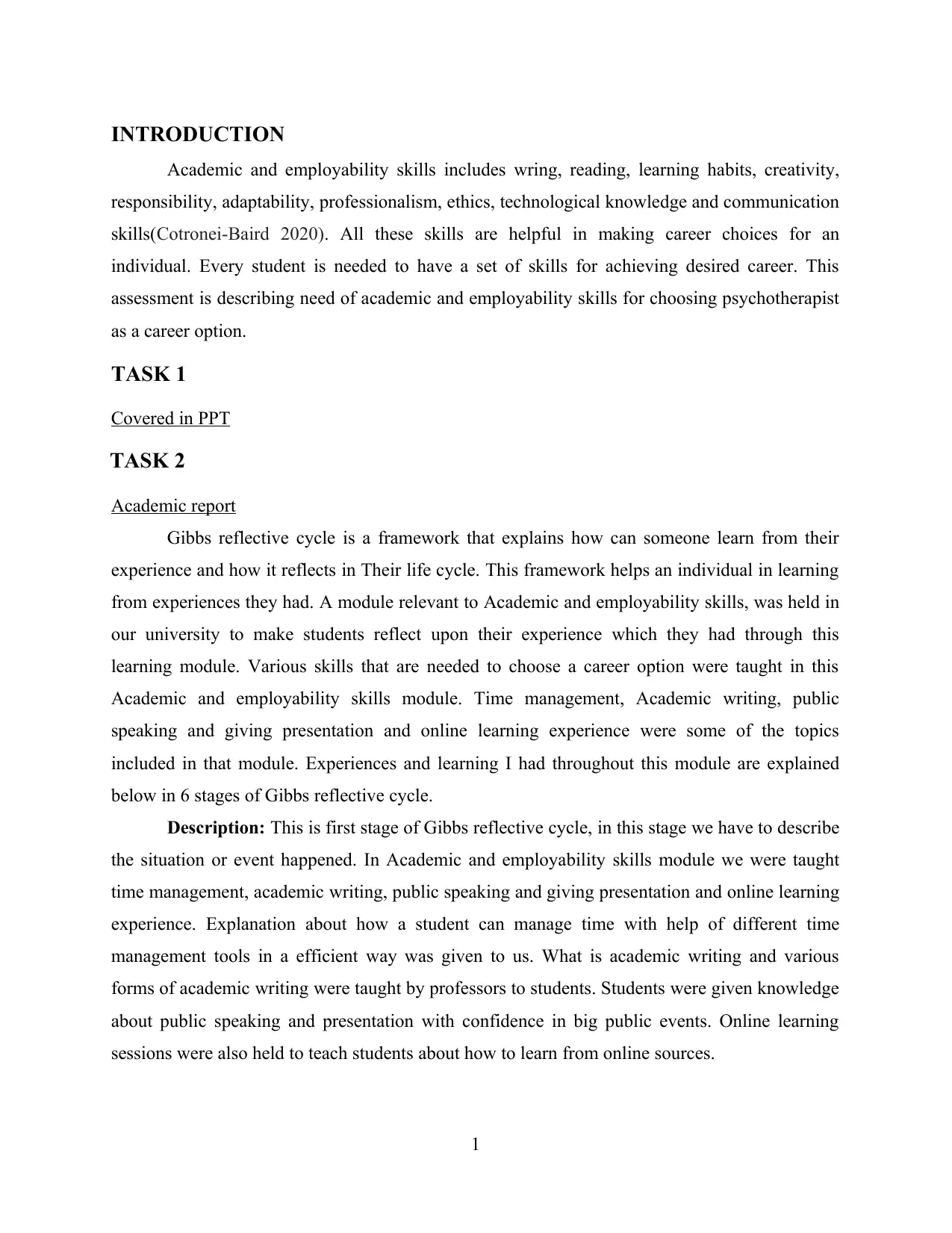
INTRODUCTION
Academic and employability skills includes wring, reading, learning habits, creativity,
responsibility, adaptability, professionalism, ethics, technological knowledge and communication
skills(Cotronei-Baird 2020). All these skills are helpful in making career choices for an
individual. Every student is needed to have a set of skills for achieving desired career. This
assessment is describing need of academic and employability skills for choosing psychotherapist
as a career option.
TASK 1
Covered in PPT
TASK 2
Academic report
Gibbs reflective cycle is a framework that explains how can someone learn from their
experience and how it reflects in Their life cycle. This framework helps an individual in learning
from experiences they had. A module relevant to Academic and employability skills, was held in
our university to make students reflect upon their experience which they had through this
learning module. Various skills that are needed to choose a career option were taught in this
Academic and employability skills module. Time management, Academic writing, public
speaking and giving presentation and online learning experience were some of the topics
included in that module. Experiences and learning I had throughout this module are explained
below in 6 stages of Gibbs reflective cycle.
Description: This is first stage of Gibbs reflective cycle, in this stage we have to describe
the situation or event happened. In Academic and employability skills module we were taught
time management, academic writing, public speaking and giving presentation and online learning
experience. Explanation about how a student can manage time with help of different time
management tools in a efficient way was given to us. What is academic writing and various
forms of academic writing were taught by professors to students. Students were given knowledge
about public speaking and presentation with confidence in big public events. Online learning
sessions were also held to teach students about how to learn from online sources.
1
Academic and employability skills includes wring, reading, learning habits, creativity,
responsibility, adaptability, professionalism, ethics, technological knowledge and communication
skills(Cotronei-Baird 2020). All these skills are helpful in making career choices for an
individual. Every student is needed to have a set of skills for achieving desired career. This
assessment is describing need of academic and employability skills for choosing psychotherapist
as a career option.
TASK 1
Covered in PPT
TASK 2
Academic report
Gibbs reflective cycle is a framework that explains how can someone learn from their
experience and how it reflects in Their life cycle. This framework helps an individual in learning
from experiences they had. A module relevant to Academic and employability skills, was held in
our university to make students reflect upon their experience which they had through this
learning module. Various skills that are needed to choose a career option were taught in this
Academic and employability skills module. Time management, Academic writing, public
speaking and giving presentation and online learning experience were some of the topics
included in that module. Experiences and learning I had throughout this module are explained
below in 6 stages of Gibbs reflective cycle.
Description: This is first stage of Gibbs reflective cycle, in this stage we have to describe
the situation or event happened. In Academic and employability skills module we were taught
time management, academic writing, public speaking and giving presentation and online learning
experience. Explanation about how a student can manage time with help of different time
management tools in a efficient way was given to us. What is academic writing and various
forms of academic writing were taught by professors to students. Students were given knowledge
about public speaking and presentation with confidence in big public events. Online learning
sessions were also held to teach students about how to learn from online sources.
1
⊘ This is a preview!⊘
Do you want full access?
Subscribe today to unlock all pages.

Trusted by 1+ million students worldwide
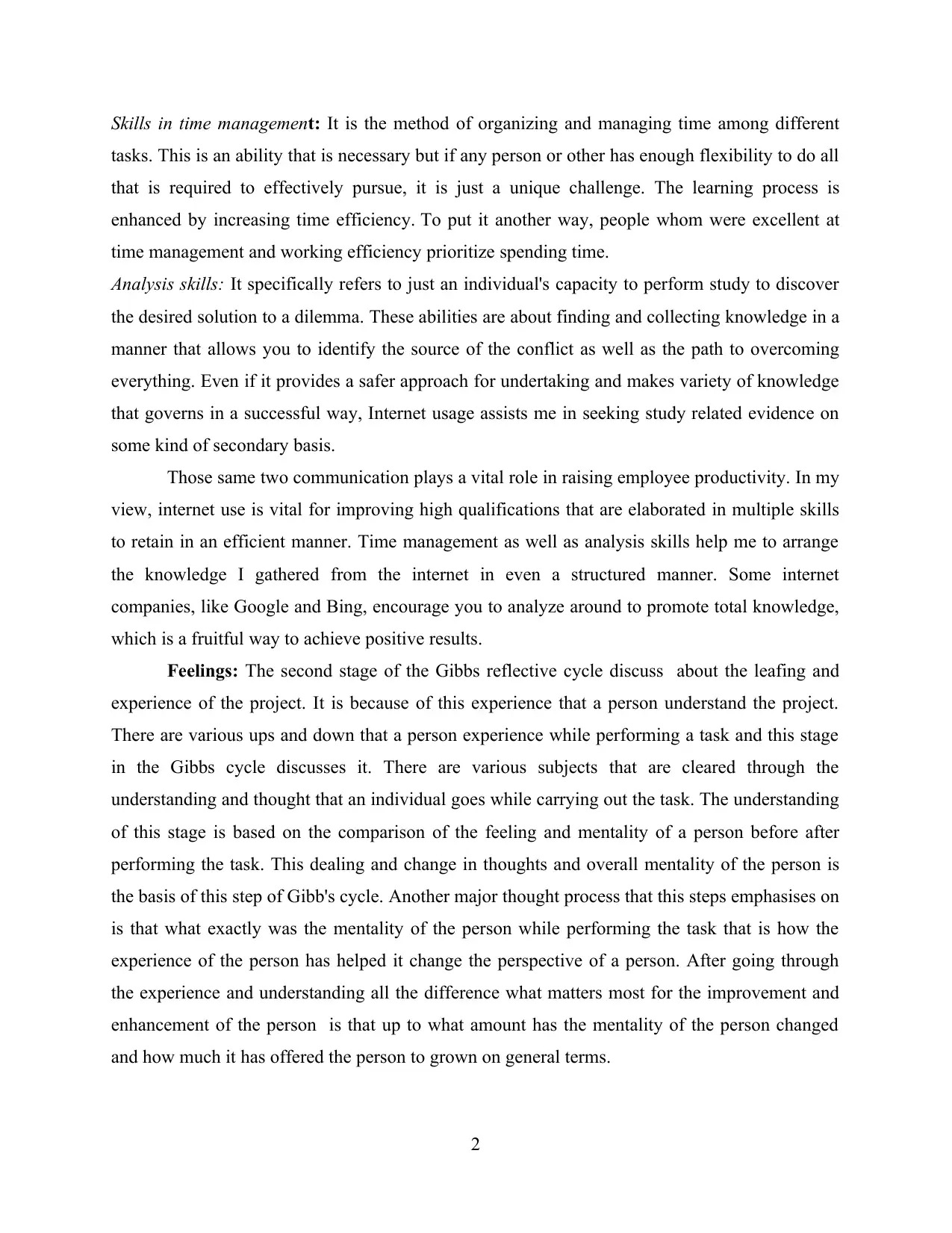
Skills in time management: It is the method of organizing and managing time among different
tasks. This is an ability that is necessary but if any person or other has enough flexibility to do all
that is required to effectively pursue, it is just a unique challenge. The learning process is
enhanced by increasing time efficiency. To put it another way, people whom were excellent at
time management and working efficiency prioritize spending time.
Analysis skills: It specifically refers to just an individual's capacity to perform study to discover
the desired solution to a dilemma. These abilities are about finding and collecting knowledge in a
manner that allows you to identify the source of the conflict as well as the path to overcoming
everything. Even if it provides a safer approach for undertaking and makes variety of knowledge
that governs in a successful way, Internet usage assists me in seeking study related evidence on
some kind of secondary basis.
Those same two communication plays a vital role in raising employee productivity. In my
view, internet use is vital for improving high qualifications that are elaborated in multiple skills
to retain in an efficient manner. Time management as well as analysis skills help me to arrange
the knowledge I gathered from the internet in even a structured manner. Some internet
companies, like Google and Bing, encourage you to analyze around to promote total knowledge,
which is a fruitful way to achieve positive results.
Feelings: The second stage of the Gibbs reflective cycle discuss about the leafing and
experience of the project. It is because of this experience that a person understand the project.
There are various ups and down that a person experience while performing a task and this stage
in the Gibbs cycle discusses it. There are various subjects that are cleared through the
understanding and thought that an individual goes while carrying out the task. The understanding
of this stage is based on the comparison of the feeling and mentality of a person before after
performing the task. This dealing and change in thoughts and overall mentality of the person is
the basis of this step of Gibb's cycle. Another major thought process that this steps emphasises on
is that what exactly was the mentality of the person while performing the task that is how the
experience of the person has helped it change the perspective of a person. After going through
the experience and understanding all the difference what matters most for the improvement and
enhancement of the person is that up to what amount has the mentality of the person changed
and how much it has offered the person to grown on general terms.
2
tasks. This is an ability that is necessary but if any person or other has enough flexibility to do all
that is required to effectively pursue, it is just a unique challenge. The learning process is
enhanced by increasing time efficiency. To put it another way, people whom were excellent at
time management and working efficiency prioritize spending time.
Analysis skills: It specifically refers to just an individual's capacity to perform study to discover
the desired solution to a dilemma. These abilities are about finding and collecting knowledge in a
manner that allows you to identify the source of the conflict as well as the path to overcoming
everything. Even if it provides a safer approach for undertaking and makes variety of knowledge
that governs in a successful way, Internet usage assists me in seeking study related evidence on
some kind of secondary basis.
Those same two communication plays a vital role in raising employee productivity. In my
view, internet use is vital for improving high qualifications that are elaborated in multiple skills
to retain in an efficient manner. Time management as well as analysis skills help me to arrange
the knowledge I gathered from the internet in even a structured manner. Some internet
companies, like Google and Bing, encourage you to analyze around to promote total knowledge,
which is a fruitful way to achieve positive results.
Feelings: The second stage of the Gibbs reflective cycle discuss about the leafing and
experience of the project. It is because of this experience that a person understand the project.
There are various ups and down that a person experience while performing a task and this stage
in the Gibbs cycle discusses it. There are various subjects that are cleared through the
understanding and thought that an individual goes while carrying out the task. The understanding
of this stage is based on the comparison of the feeling and mentality of a person before after
performing the task. This dealing and change in thoughts and overall mentality of the person is
the basis of this step of Gibb's cycle. Another major thought process that this steps emphasises on
is that what exactly was the mentality of the person while performing the task that is how the
experience of the person has helped it change the perspective of a person. After going through
the experience and understanding all the difference what matters most for the improvement and
enhancement of the person is that up to what amount has the mentality of the person changed
and how much it has offered the person to grown on general terms.
2
Paraphrase This Document
Need a fresh take? Get an instant paraphrase of this document with our AI Paraphraser
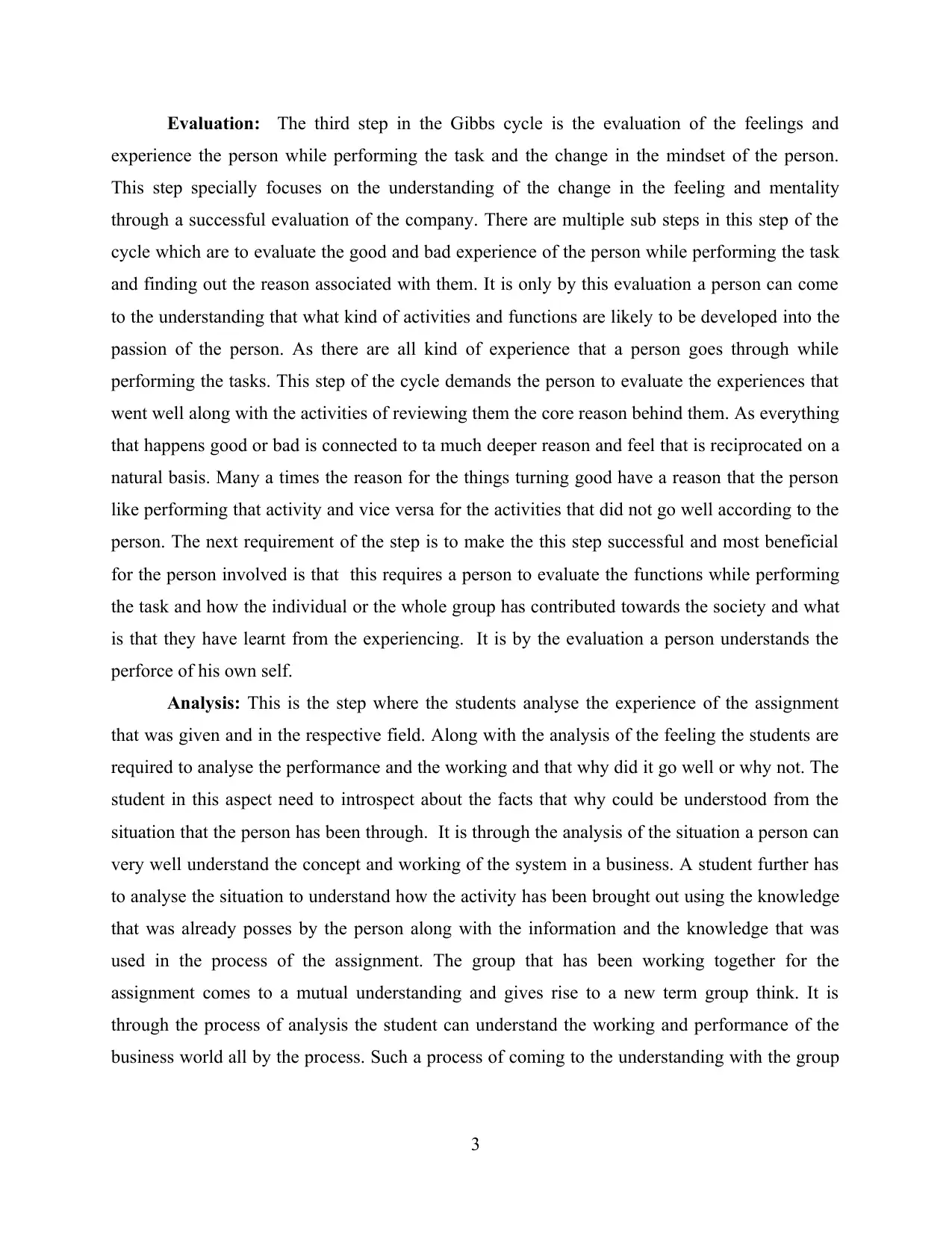
Evaluation: The third step in the Gibbs cycle is the evaluation of the feelings and
experience the person while performing the task and the change in the mindset of the person.
This step specially focuses on the understanding of the change in the feeling and mentality
through a successful evaluation of the company. There are multiple sub steps in this step of the
cycle which are to evaluate the good and bad experience of the person while performing the task
and finding out the reason associated with them. It is only by this evaluation a person can come
to the understanding that what kind of activities and functions are likely to be developed into the
passion of the person. As there are all kind of experience that a person goes through while
performing the tasks. This step of the cycle demands the person to evaluate the experiences that
went well along with the activities of reviewing them the core reason behind them. As everything
that happens good or bad is connected to ta much deeper reason and feel that is reciprocated on a
natural basis. Many a times the reason for the things turning good have a reason that the person
like performing that activity and vice versa for the activities that did not go well according to the
person. The next requirement of the step is to make the this step successful and most beneficial
for the person involved is that this requires a person to evaluate the functions while performing
the task and how the individual or the whole group has contributed towards the society and what
is that they have learnt from the experiencing. It is by the evaluation a person understands the
perforce of his own self.
Analysis: This is the step where the students analyse the experience of the assignment
that was given and in the respective field. Along with the analysis of the feeling the students are
required to analyse the performance and the working and that why did it go well or why not. The
student in this aspect need to introspect about the facts that why could be understood from the
situation that the person has been through. It is through the analysis of the situation a person can
very well understand the concept and working of the system in a business. A student further has
to analyse the situation to understand how the activity has been brought out using the knowledge
that was already posses by the person along with the information and the knowledge that was
used in the process of the assignment. The group that has been working together for the
assignment comes to a mutual understanding and gives rise to a new term group think. It is
through the process of analysis the student can understand the working and performance of the
business world all by the process. Such a process of coming to the understanding with the group
3
experience the person while performing the task and the change in the mindset of the person.
This step specially focuses on the understanding of the change in the feeling and mentality
through a successful evaluation of the company. There are multiple sub steps in this step of the
cycle which are to evaluate the good and bad experience of the person while performing the task
and finding out the reason associated with them. It is only by this evaluation a person can come
to the understanding that what kind of activities and functions are likely to be developed into the
passion of the person. As there are all kind of experience that a person goes through while
performing the tasks. This step of the cycle demands the person to evaluate the experiences that
went well along with the activities of reviewing them the core reason behind them. As everything
that happens good or bad is connected to ta much deeper reason and feel that is reciprocated on a
natural basis. Many a times the reason for the things turning good have a reason that the person
like performing that activity and vice versa for the activities that did not go well according to the
person. The next requirement of the step is to make the this step successful and most beneficial
for the person involved is that this requires a person to evaluate the functions while performing
the task and how the individual or the whole group has contributed towards the society and what
is that they have learnt from the experiencing. It is by the evaluation a person understands the
perforce of his own self.
Analysis: This is the step where the students analyse the experience of the assignment
that was given and in the respective field. Along with the analysis of the feeling the students are
required to analyse the performance and the working and that why did it go well or why not. The
student in this aspect need to introspect about the facts that why could be understood from the
situation that the person has been through. It is through the analysis of the situation a person can
very well understand the concept and working of the system in a business. A student further has
to analyse the situation to understand how the activity has been brought out using the knowledge
that was already posses by the person along with the information and the knowledge that was
used in the process of the assignment. The group that has been working together for the
assignment comes to a mutual understanding and gives rise to a new term group think. It is
through the process of analysis the student can understand the working and performance of the
business world all by the process. Such a process of coming to the understanding with the group
3
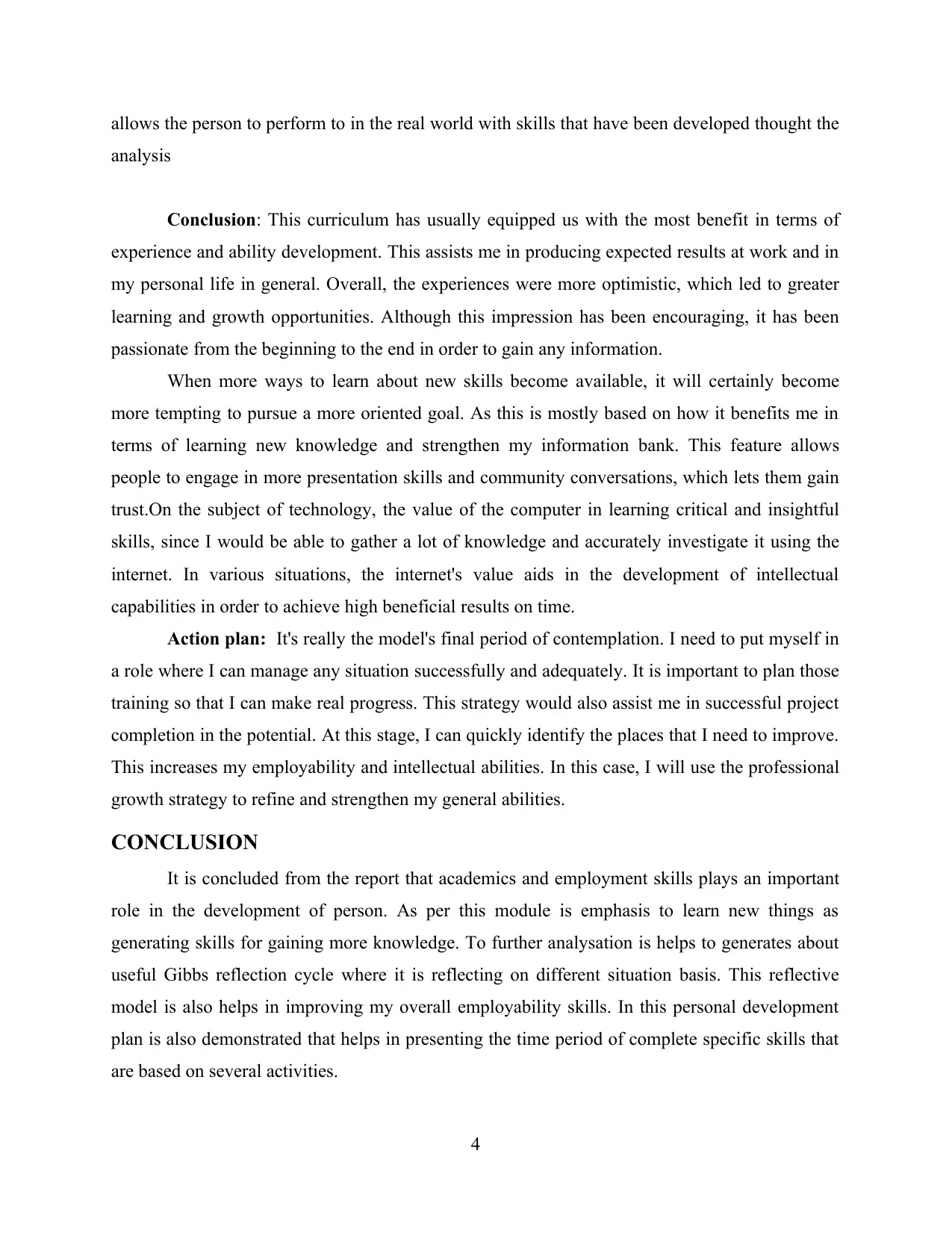
allows the person to perform to in the real world with skills that have been developed thought the
analysis
Conclusion: This curriculum has usually equipped us with the most benefit in terms of
experience and ability development. This assists me in producing expected results at work and in
my personal life in general. Overall, the experiences were more optimistic, which led to greater
learning and growth opportunities. Although this impression has been encouraging, it has been
passionate from the beginning to the end in order to gain any information.
When more ways to learn about new skills become available, it will certainly become
more tempting to pursue a more oriented goal. As this is mostly based on how it benefits me in
terms of learning new knowledge and strengthen my information bank. This feature allows
people to engage in more presentation skills and community conversations, which lets them gain
trust.On the subject of technology, the value of the computer in learning critical and insightful
skills, since I would be able to gather a lot of knowledge and accurately investigate it using the
internet. In various situations, the internet's value aids in the development of intellectual
capabilities in order to achieve high beneficial results on time.
Action plan: It's really the model's final period of contemplation. I need to put myself in
a role where I can manage any situation successfully and adequately. It is important to plan those
training so that I can make real progress. This strategy would also assist me in successful project
completion in the potential. At this stage, I can quickly identify the places that I need to improve.
This increases my employability and intellectual abilities. In this case, I will use the professional
growth strategy to refine and strengthen my general abilities.
CONCLUSION
It is concluded from the report that academics and employment skills plays an important
role in the development of person. As per this module is emphasis to learn new things as
generating skills for gaining more knowledge. To further analysation is helps to generates about
useful Gibbs reflection cycle where it is reflecting on different situation basis. This reflective
model is also helps in improving my overall employability skills. In this personal development
plan is also demonstrated that helps in presenting the time period of complete specific skills that
are based on several activities.
4
analysis
Conclusion: This curriculum has usually equipped us with the most benefit in terms of
experience and ability development. This assists me in producing expected results at work and in
my personal life in general. Overall, the experiences were more optimistic, which led to greater
learning and growth opportunities. Although this impression has been encouraging, it has been
passionate from the beginning to the end in order to gain any information.
When more ways to learn about new skills become available, it will certainly become
more tempting to pursue a more oriented goal. As this is mostly based on how it benefits me in
terms of learning new knowledge and strengthen my information bank. This feature allows
people to engage in more presentation skills and community conversations, which lets them gain
trust.On the subject of technology, the value of the computer in learning critical and insightful
skills, since I would be able to gather a lot of knowledge and accurately investigate it using the
internet. In various situations, the internet's value aids in the development of intellectual
capabilities in order to achieve high beneficial results on time.
Action plan: It's really the model's final period of contemplation. I need to put myself in
a role where I can manage any situation successfully and adequately. It is important to plan those
training so that I can make real progress. This strategy would also assist me in successful project
completion in the potential. At this stage, I can quickly identify the places that I need to improve.
This increases my employability and intellectual abilities. In this case, I will use the professional
growth strategy to refine and strengthen my general abilities.
CONCLUSION
It is concluded from the report that academics and employment skills plays an important
role in the development of person. As per this module is emphasis to learn new things as
generating skills for gaining more knowledge. To further analysation is helps to generates about
useful Gibbs reflection cycle where it is reflecting on different situation basis. This reflective
model is also helps in improving my overall employability skills. In this personal development
plan is also demonstrated that helps in presenting the time period of complete specific skills that
are based on several activities.
4
⊘ This is a preview!⊘
Do you want full access?
Subscribe today to unlock all pages.

Trusted by 1+ million students worldwide
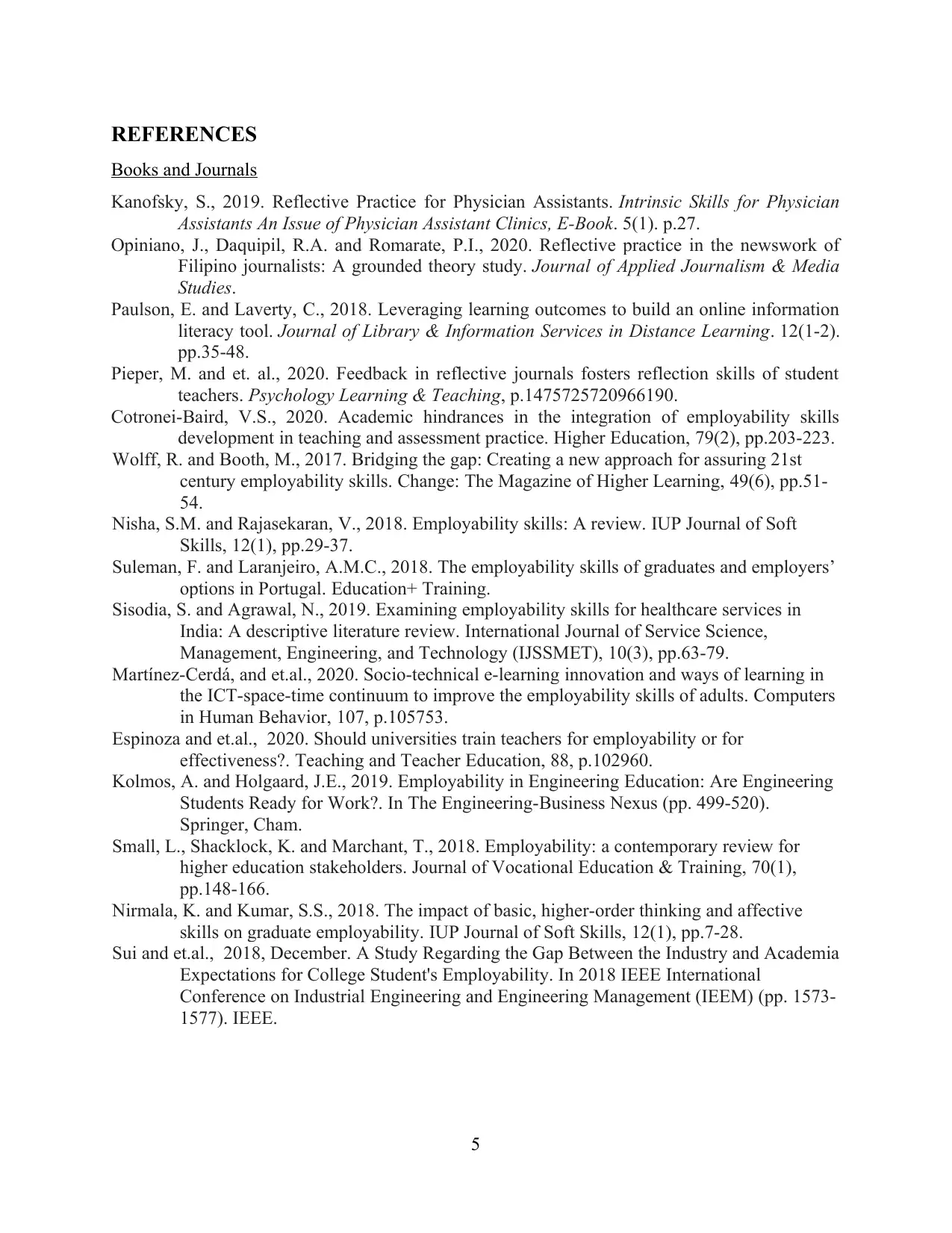
REFERENCES
Books and Journals
Kanofsky, S., 2019. Reflective Practice for Physician Assistants. Intrinsic Skills for Physician
Assistants An Issue of Physician Assistant Clinics, E-Book. 5(1). p.27.
Opiniano, J., Daquipil, R.A. and Romarate, P.I., 2020. Reflective practice in the newswork of
Filipino journalists: A grounded theory study. Journal of Applied Journalism & Media
Studies.
Paulson, E. and Laverty, C., 2018. Leveraging learning outcomes to build an online information
literacy tool. Journal of Library & Information Services in Distance Learning. 12(1-2).
pp.35-48.
Pieper, M. and et. al., 2020. Feedback in reflective journals fosters reflection skills of student
teachers. Psychology Learning & Teaching, p.1475725720966190.
Cotronei-Baird, V.S., 2020. Academic hindrances in the integration of employability skills
development in teaching and assessment practice. Higher Education, 79(2), pp.203-223.
Wolff, R. and Booth, M., 2017. Bridging the gap: Creating a new approach for assuring 21st
century employability skills. Change: The Magazine of Higher Learning, 49(6), pp.51-
54.
Nisha, S.M. and Rajasekaran, V., 2018. Employability skills: A review. IUP Journal of Soft
Skills, 12(1), pp.29-37.
Suleman, F. and Laranjeiro, A.M.C., 2018. The employability skills of graduates and employers’
options in Portugal. Education+ Training.
Sisodia, S. and Agrawal, N., 2019. Examining employability skills for healthcare services in
India: A descriptive literature review. International Journal of Service Science,
Management, Engineering, and Technology (IJSSMET), 10(3), pp.63-79.
Martínez-Cerdá, and et.al., 2020. Socio-technical e-learning innovation and ways of learning in
the ICT-space-time continuum to improve the employability skills of adults. Computers
in Human Behavior, 107, p.105753.
Espinoza and et.al., 2020. Should universities train teachers for employability or for
effectiveness?. Teaching and Teacher Education, 88, p.102960.
Kolmos, A. and Holgaard, J.E., 2019. Employability in Engineering Education: Are Engineering
Students Ready for Work?. In The Engineering-Business Nexus (pp. 499-520).
Springer, Cham.
Small, L., Shacklock, K. and Marchant, T., 2018. Employability: a contemporary review for
higher education stakeholders. Journal of Vocational Education & Training, 70(1),
pp.148-166.
Nirmala, K. and Kumar, S.S., 2018. The impact of basic, higher-order thinking and affective
skills on graduate employability. IUP Journal of Soft Skills, 12(1), pp.7-28.
Sui and et.al., 2018, December. A Study Regarding the Gap Between the Industry and Academia
Expectations for College Student's Employability. In 2018 IEEE International
Conference on Industrial Engineering and Engineering Management (IEEM) (pp. 1573-
1577). IEEE.
5
Books and Journals
Kanofsky, S., 2019. Reflective Practice for Physician Assistants. Intrinsic Skills for Physician
Assistants An Issue of Physician Assistant Clinics, E-Book. 5(1). p.27.
Opiniano, J., Daquipil, R.A. and Romarate, P.I., 2020. Reflective practice in the newswork of
Filipino journalists: A grounded theory study. Journal of Applied Journalism & Media
Studies.
Paulson, E. and Laverty, C., 2018. Leveraging learning outcomes to build an online information
literacy tool. Journal of Library & Information Services in Distance Learning. 12(1-2).
pp.35-48.
Pieper, M. and et. al., 2020. Feedback in reflective journals fosters reflection skills of student
teachers. Psychology Learning & Teaching, p.1475725720966190.
Cotronei-Baird, V.S., 2020. Academic hindrances in the integration of employability skills
development in teaching and assessment practice. Higher Education, 79(2), pp.203-223.
Wolff, R. and Booth, M., 2017. Bridging the gap: Creating a new approach for assuring 21st
century employability skills. Change: The Magazine of Higher Learning, 49(6), pp.51-
54.
Nisha, S.M. and Rajasekaran, V., 2018. Employability skills: A review. IUP Journal of Soft
Skills, 12(1), pp.29-37.
Suleman, F. and Laranjeiro, A.M.C., 2018. The employability skills of graduates and employers’
options in Portugal. Education+ Training.
Sisodia, S. and Agrawal, N., 2019. Examining employability skills for healthcare services in
India: A descriptive literature review. International Journal of Service Science,
Management, Engineering, and Technology (IJSSMET), 10(3), pp.63-79.
Martínez-Cerdá, and et.al., 2020. Socio-technical e-learning innovation and ways of learning in
the ICT-space-time continuum to improve the employability skills of adults. Computers
in Human Behavior, 107, p.105753.
Espinoza and et.al., 2020. Should universities train teachers for employability or for
effectiveness?. Teaching and Teacher Education, 88, p.102960.
Kolmos, A. and Holgaard, J.E., 2019. Employability in Engineering Education: Are Engineering
Students Ready for Work?. In The Engineering-Business Nexus (pp. 499-520).
Springer, Cham.
Small, L., Shacklock, K. and Marchant, T., 2018. Employability: a contemporary review for
higher education stakeholders. Journal of Vocational Education & Training, 70(1),
pp.148-166.
Nirmala, K. and Kumar, S.S., 2018. The impact of basic, higher-order thinking and affective
skills on graduate employability. IUP Journal of Soft Skills, 12(1), pp.7-28.
Sui and et.al., 2018, December. A Study Regarding the Gap Between the Industry and Academia
Expectations for College Student's Employability. In 2018 IEEE International
Conference on Industrial Engineering and Engineering Management (IEEM) (pp. 1573-
1577). IEEE.
5
Paraphrase This Document
Need a fresh take? Get an instant paraphrase of this document with our AI Paraphraser

6
1 out of 8
Related Documents
Your All-in-One AI-Powered Toolkit for Academic Success.
+13062052269
info@desklib.com
Available 24*7 on WhatsApp / Email
![[object Object]](/_next/static/media/star-bottom.7253800d.svg)
Unlock your academic potential
Copyright © 2020–2026 A2Z Services. All Rights Reserved. Developed and managed by ZUCOL.



